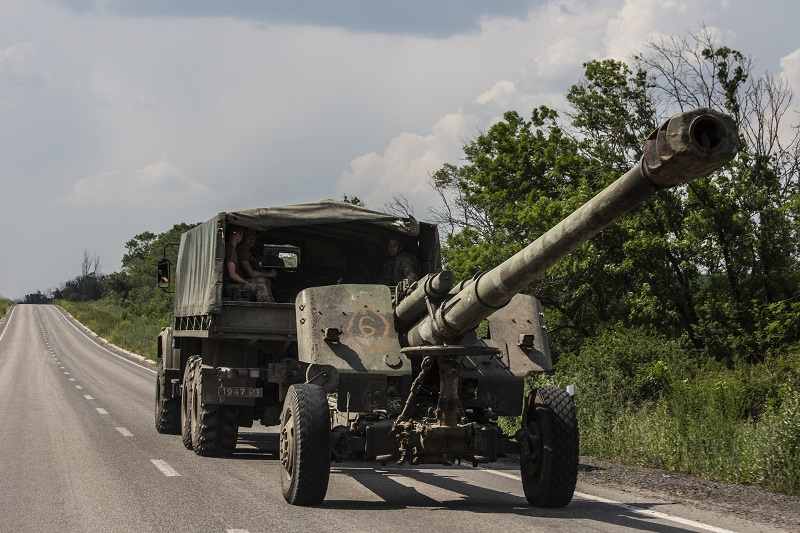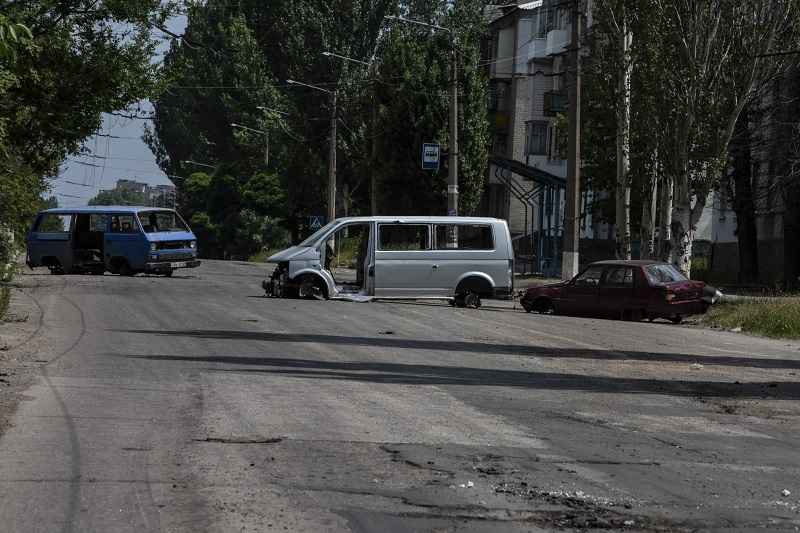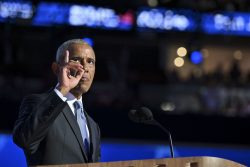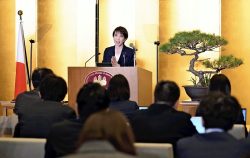
Ukrainian forces transport a 152 mm howitzer along a main road in the Donbas region of eastern Ukraine on June 12.
11:35 JST, June 14, 2022
LYSYCHANSK, Ukraine – Ukrainian troops struggled to repel Russian advances in the country’s Donbas region on Monday, as Kremlin forces pushed into areas key to Moscow’s goal of cementing its control of eastern Ukraine.
Ukraine’s military said that Ukrainian fighters were forced to withdraw from central Severodonetsk, a strategic city in the Luhansk region, marking a “partial success” for Russia. Russian forces now control about three-quarters of the city, officials said, a worrying sign as Kyiv struggles to regain the battlefield advantage it enjoyed in the initial months after President Vladimir Putin’s Feb. 24 invasion.
Oleksandr Motuzyanyk, a spokesman for Ukraine’s Defense Ministry, said that local forces continued to put up a fierce defense in Severodonetsk but acknowledged that Russian troops control the city center. He said Russian gains were made possible by the use of heavy artillery and air power. “Russian forces continue to use tactics from the time of the Second World War,” he said.
U.S. officials believe Severodonetsk could fall within days, paving the way for Russia to complete its control of Luhansk, one of two governates in the Donbas region, in the coming weeks. If that occurs, it would represent a major turnaround for Moscow after the early months of the war, when Russian troops failed to capture the capital Kyiv and other key areas of central Ukraine.

Ruined vehicles are used for a roadblock in Lysychansk, Ukraine.
Luhansk governor Serhiy Haidai said that many residents had fled intense Russian shelling, which has struck homes, kindergartens and commercial areas across the region. In a Telegram post Monday, he said that approximately 500 civilians, including about 40 children, had taken shelter from Russian bombardment in bunkers under the Azot chemical plant in Severodonetsk.
As Ukrainian forces face greater resistance, President Volodymyr Zelensky called for Ukraine’s supporters to provide additional military aid, including more missile defense and artillery systems. Ukrainian troops, suffering increasing casualties, also lack sufficient ammunition.
“The price of this battle for us is very high. It’s just scary,” Zelensky said in a nightly video address. “We draw the attention of our partners on a daily basis to the fact that only a sufficient number of modern artillery for Ukraine will ensure our advantage and finally the end of Russian torture of the Ukrainian Donbas.”
As some of Ukraine’s backers in the West consider what the terms of a negotiated settlement might be, Zelensky has shown little openness to concessions by Kyiv, promising to liberate cities such as Kherson and Mariupol, and also Yalta, on the Russian-annexed Crimean peninsula.
“It only takes enough weapons to make it happen,” he said. “The partners have it in sufficient quantities. And we work every day for the political will to give us these weapons to appear.”
Russian forces are making advances in other areas of the country’s east, pushing toward Slovyansk in the neighboring Donetsk region, officials said.
Denis Pushilin, the pro-Russian separatist who heads the self-declared Donetsk People’s Republic, called for additional military aid from Russia because of what he said was increased shelling by the government side.
Pushilin, speaking in a video address, urged citizens to stay inside. “The enemy has literally crossed all the lines,” he said. “Prohibited methods of warfare are being used; residential and central districts of Donetsk are being shelled; and other cities and towns of the DPR are now under fire.”
Britain’s Defense Ministry said that river-crossing operations may play an increasingly important role in the conflict in coming months, as Russian forces focus their firepower on cities such as Severodonetsk and Lysychansk that rely on river traffic for resupply.
To control the Donbas region, Russia is “either going to have to complete ambitious flanking actions, or conduct assault river crossings,” the ministry said on Monday. It said Russian forces had struggled to mount successful river-crossing operations and respond to Ukrainian demolition of bridges.
Haidai said that Russia’s military had struck a bridge over the Siversky Donets river, which links Severodonetsk and Lysychansk, on Sunday, eliminating an evacuation route for civilians.
Civilians who have remained face dire conditions, many of them forced to shelter underground amid regular Russian shelling. One of those people is Lysychansk resident Lyubov Nefedova, 68, who has stayed in a school basement since February, sleeping on chairs and living in near-total darkness.
At night, she finds comfort only in her sister, who sleeps beside her. Like many others, Nefedova is holding out hope that Ukrainian forces still may repel an increasingly imminent assault.
“I was born here. I live here,” Nefedova said. But for months, even her apartment has felt too far to be safe. “So I don’t leave this place.”
Lysychansk’s streets are nearly empty. Downtown, evidence of recent attacks is everywhere. A university building has burned to the ground. The windows of its administrative building are shattered. Soldiers are tense, searching cars at every checkpoint.
No civilians linger near a large sign reading “I<3 LYSYCHANSK.”
Instead, like Nefedova, they are hiding inside, mainly in areas of town farthest away from Severodonetsk and the river that divides the two cities. They are insistent that they will not leave – many because they know they cannot afford to live elsewhere.
“A typical day in Lysychansk right now is simple,” said Serhii Bystrikov, 37. “You prepare food, you go to the school to get aid, and then you go to the bunker, because it’s too scary to stay on the eighth floor of my apartment.”
From humanitarian handouts, Bystrikov has enough to get by: rice, macaroni, canned meat, water and bread. Until recently, he worked at the Azot chemical plant. In the school where he is sheltering, makeshift beds lined the basement floor. Upstairs, volunteers taught teachers how to tie improvised tourniquets, using the strap of a purse as an example. Outside, the boom of outgoing artillery rang across the sky.

An emergency distribution center at a school in Lysychansk in the eastern Donbas region on June 11, 2022.
Russian forces continued their advance as Western nations debate the future shape of NATO ahead of a meeting of alliance leaders on June 29.
While NATO officials had expected the membership applications of Finland and Sweden – a reflection of how Putin’s war has altered the security outlook in Europe – to proceed quickly, objections from member Turkey have thrown that notion into doubt.
Officials had hoped that the technical talks on those countries’ accession would be completed by the Madrid summit. That now looks unlikely.
Speaking after talks in Brussels on Monday, Swedish Prime Minister Magdalena Andersson said that Sweden was working to address Turkey’s concerns, which involve the Nordic nations’ stance on arms sales to Turkey and their treatment of individuals Ankara says are part of the banned Kurdistan Workers’ Party (PKK).
Andersson said that Stockholm would advance “much stronger legislation” on weapons exports and militant activity as part of its effort to secure Turkish support. “We will of course very clearly state how we are working against terrorism and fighting against terrorism,” she said.
NATO Secretary General Jens Stoltenberg said he hoped for an agreement “as soon as possible” that would permit the two countries’ inclusion, which would add two advanced militaries to the alliance and double the NATO-Russia land border.
But, he added, “When several nations are involved in those talks, there is no way to say exactly when we can solve and move forward on those issues.”
Top Articles in News Services
-

Prudential Life Expected to Face Inspection over Fraud
-

Hong Kong Ex-Publisher Jimmy Lai’s Sentence Raises International Outcry as China Defends It
-

Japan’s Nikkei Stock Average Touches 58,000 as Yen, Jgbs Rally on Election Fallout (UPDATE 1)
-

Trump Names Former Federal Reserve Governor Warsh as the Next Fed Chair, Replacing Powell
-

Suzuki Overtakes Nissan as Japan’s Third‑Largest Automaker in 2025
JN ACCESS RANKING
-

Japan Institute to Use Domestic Commercial Optical Lattice Clock to Set Japan Standard Time
-

Israeli Ambassador to Japan Speaks about Japan’s Role in the Reconstruction of Gaza
-

Man Infected with Measles May Have Come in Contact with Many People in Tokyo, Went to Store, Restaurant Around When Symptoms Emerged
-

Prudential Life Insurance Plans to Fully Compensate for Damages Caused by Fraudulent Actions Without Waiting for Third-Party Committee Review
-

Woman with Measles Visited Hospital in Tokyo Multiple Times Before Being Diagnosed with Disease

























